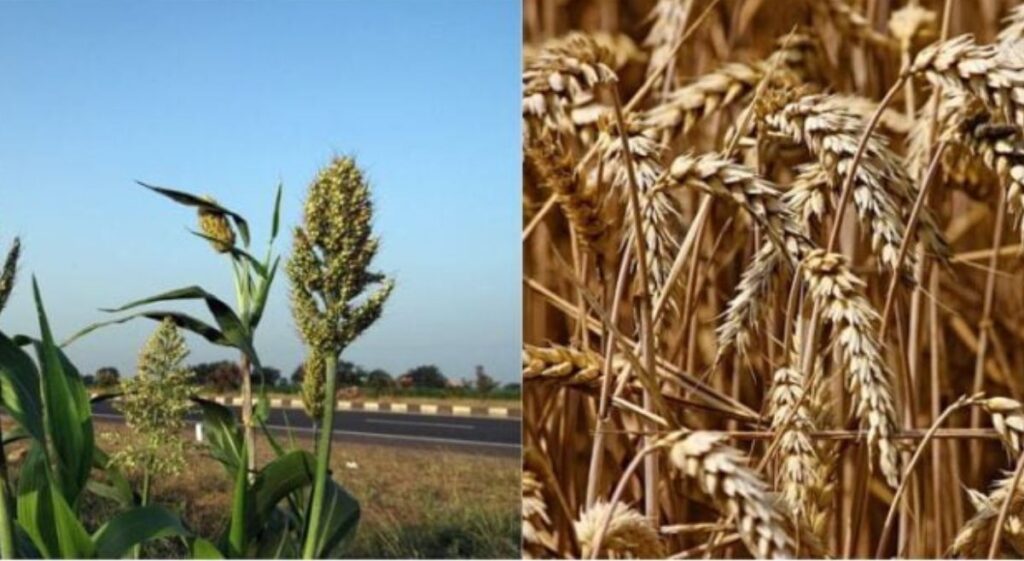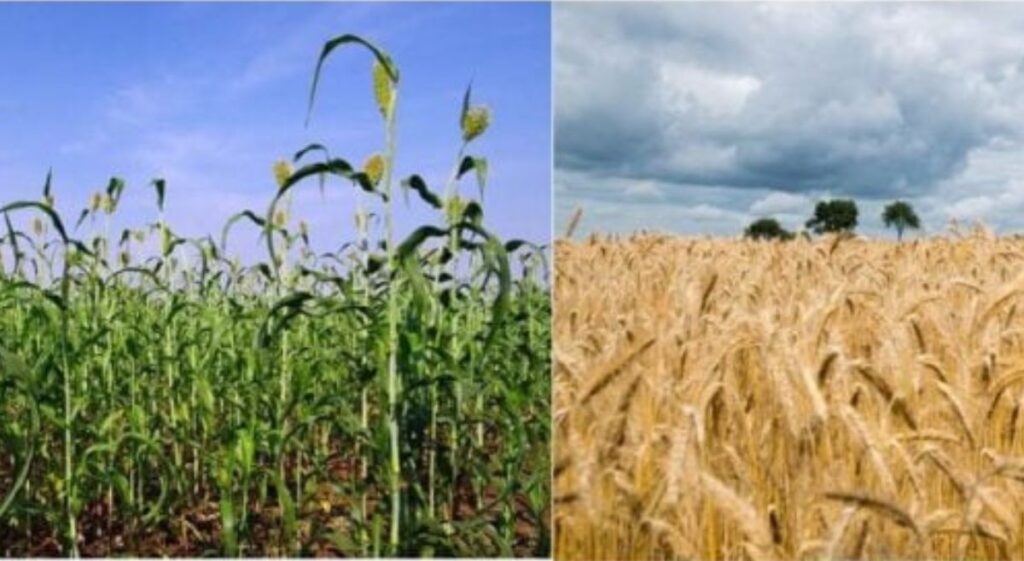Introduction:-
Is Jowar a Healthier Alternative to Wheat? Discover the Benefits”

In recent years, there has been growing interest in ancient grains like jowar, also known as sorghum, as people seek healthier and more sustainable alternatives to conventional staples like wheat. But is jowar truly superior to wheat? Let’s explore the nutritional, health, and environmental aspects of both grains to help you make an informed choice.
What are the health benefits of jowar compared to wheat?
1. Nutritional Comparison
Jowar:
- High in Fiber: Jowar is rich in dietary fiber, with about 6.7 grams per 100 grams, which aids digestion and helps in maintaining healthy cholesterol levels.
- Gluten-Free: Jowar is naturally gluten-free, making it an excellent option for those with gluten intolerance or celiac disease.
- Rich in Antioxidants: It contains antioxidants like tannins and phenolic acids that help protect the body from oxidative stress.
- Essential Minerals: Jowar is a good source of magnesium, iron, and phosphorus, which are vital for bone health and energy production.
Wheat:
- Higher in Protein: Wheat provides about 13 grams of protein per 100 grams, which is higher than jowar. Protein is essential for muscle repair and growth.
- Rich in B Vitamins: Wheat is a significant source of B vitamins, particularly niacin, thiamin, and riboflavin, which are important for energy metabolism.
- Contains Gluten: While gluten is beneficial for making bread and baked goods, it can be problematic for those with gluten sensitivity.
2. Health Benefits
Jowar:
- Weight Management: Due to its high fiber content, jowar can help you feel fuller for longer, reducing overall calorie intake and aiding in weight management.
- Blood Sugar Control: The fiber in jowar also helps regulate blood sugar levels, making it a better choice for individuals with diabetes.
- Heart Health: Jowar’s antioxidant properties and ability to lower cholesterol levels contribute to better heart health.
Wheat:
- Energy Boost: Wheat’s higher carbohydrate and protein content provide a quick and sustained energy boost, which is beneficial for active individuals.
- Supports Gut Health: The fiber in wheat, especially whole wheat, supports a healthy digestive system by promoting regular bowel movements.
3. Environmental Impact
Jowar:
- Drought-Resistant: Jowar is a hardy crop that requires less water than wheat, making it more sustainable, especially in arid regions.
- Soil Health: Jowar helps improve soil health by reducing the need for chemical fertilizers and pesticides.
Wheat:
- Water-Intensive: Wheat cultivation typically requires more water, which can be a concern in water-scarce areas.
- Monocropping Issues: The widespread monocropping of wheat can lead to soil degradation and increased vulnerability to pests and diseases.
4. Culinary Uses
Jowar:
- Versatile Ingredient: Jowar can be used in a variety of dishes, from traditional flatbreads (rotis) to porridges, salads, and even gluten-free baked goods.
- Neutral Flavor: Jowar’s mild flavor makes it a versatile grain that can easily blend with other ingredients without overpowering them.
Wheat:
Wide Availability: Wheat is more widely available and familiar to most people, making it a convenient choice for everyday cooking.
Baking Staple: Wheat’s gluten content makes it ideal for baking bread, cakes, and pastries. Its texture and elasticity are unmatched in the culinary world.
How does jowar help in managing blood sugar levels?
Jowar is considered beneficial for managing blood sugar levels, making it an excellent option for individuals with diabetes or those looking to maintain stable blood sugar levels. Here’s how jowar helps in this regard:
1. High Fiber Content
- Slows Sugar Absorption: Jowar is rich in dietary fiber, particularly soluble fiber, which slows down the digestion and absorption of carbohydrates. This gradual release of glucose into the bloodstream prevents sudden spikes in blood sugar levels.
- Promotes Satiety: The high fiber content also helps you feel fuller for longer, reducing the likelihood of overeating and contributing to better weight management.
2. Low Glycemic Index
- Steady Blood Sugar Levels: Jowar has a low glycemic index (GI), meaning it releases glucose more slowly and steadily compared to high-GI foods like refined wheat. This slow release helps keep blood sugar levels more stable over time.
3. Rich in Complex Carbohydrates
- Sustained Energy: Jowar contains complex carbohydrates that provide sustained energy without causing rapid increases in blood glucose. This makes it a suitable grain for maintaining consistent energy levels throughout the day.
4. Contains Resistant Starch
- Improved Insulin Sensitivity: Jowar contains resistant starch, a type of carbohydrate that resists digestion in the small intestine. This resistant starch acts like fiber, feeding beneficial gut bacteria and improving insulin sensitivity, which is crucial for managing blood sugar levels.
5. Nutrient-Dense Profile
- Magnesium for Glucose Regulation: Jowar is a good source of magnesium, a mineral that plays a key role in glucose regulation and insulin sensitivity. Adequate magnesium intake can help reduce the risk of insulin resistance.
Incorporating jowar into your diet can be a smart choice for those looking to manage blood sugar levels naturally, whether you’re aiming to prevent diabetes or manage existing conditions. Its combination of fiber, complex carbohydrates, and essential nutrients makes jowar a grain worth considering for blood sugar control.
What are the environmental benefits of growing jowar instead of wheat?
Growing jowar (sorghum) instead of wheat offers several environmental benefits, making it a more sustainable choice for agriculture. Here are some key advantages:
1. Drought Resistance
- Less Water Usage: Jowar is a drought-resistant crop, requiring significantly less water than wheat. It can thrive in arid and semi-arid regions where water resources are limited. This makes jowar an ideal crop for regions facing water scarcity, reducing the strain on local water supplies.
- Resilient Growth: Jowar’s ability to grow in low-water conditions reduces the need for irrigation, helping to conserve water and mitigate the impact of droughts on agricultural production.
2. Lower Input Requirements
- Reduced Dependence on Fertilizers and Pesticides: Jowar is generally more resilient to pests and diseases compared to wheat, meaning it requires fewer chemical inputs like pesticides and fertilizers. This reduces the environmental pollution associated with chemical runoff and promotes healthier ecosystems.
- Sustainable Farming Practices: Jowar can be grown with minimal agricultural inputs, making it suitable for low-input farming systems that emphasize sustainability and environmental stewardship.
3. Soil Health Improvement
- Soil Conservation: Jowar’s deep root system helps to improve soil structure and reduce erosion. It can also enhance soil fertility by breaking up compacted soil and promoting better water infiltration.
- Crop Rotation Benefits: When used in crop rotation, jowar can help replenish the soil with nutrients, reduce soil depletion, and break pest and disease cycles that commonly affect monocultures like wheat.
4. Climate Adaptability
- Heat Tolerance: Jowar is highly adaptable to high temperatures and can thrive in regions where wheat might struggle due to heat stress. This makes jowar a more viable crop in the face of climate change, which is expected to increase global temperatures and lead to more frequent heatwaves.
- Carbon Sequestration: The extensive root system of jowar can contribute to carbon sequestration, helping to capture carbon dioxide from the atmosphere and store it in the soil, which is a key strategy for mitigating climate change.
5. Biodiversity Support
- Promotes Agricultural Biodiversity: By diversifying crop production with jowar, farmers can reduce their reliance on a single staple crop like wheat. This not only enhances food security but also promotes biodiversity in agricultural landscapes, which is crucial for resilient and sustainable farming systems.
Growing jowar instead of wheat offers significant environmental benefits, particularly in terms of water conservation, soil health, and adaptability to changing climate conditions. As the world faces increasing challenges related to water scarcity, climate change, and the need for sustainable farming practices, jowar presents itself as a valuable crop that can help address these issues while contributing to more resilient agricultural systems.
Why should I consider switching from wheat to jowar in my diet?
Switching from wheat to jowar (sorghum) in your diet can offer a range of benefits that align with health goals, dietary needs, and sustainability considerations. Here’s why you might consider making the switch:

1. Health Benefits
- Gluten-Free: Jowar is naturally gluten-free, making it an excellent choice for individuals with celiac disease or gluten sensitivity. This can help alleviate symptoms related to gluten intolerance and offer a wider range of dietary options.
- High Fiber Content: Jowar is rich in dietary fiber, which supports digestive health, helps manage blood sugar levels, and aids in weight management by promoting satiety.
- Nutrient-Rich: Jowar provides essential vitamins and minerals such as magnesium, iron, and phosphorus. These nutrients support overall health, including bone strength, energy levels, and metabolic function.
- Antioxidant Properties: It contains antioxidants that help combat oxidative stress and inflammation, potentially reducing the risk of chronic diseases.
2. Blood Sugar Management
- Low Glycemic Index: Jowar has a low glycemic index, meaning it releases glucose into the bloodstream more slowly than high-glycemic foods like refined wheat. This helps maintain stable blood sugar levels and can be particularly beneficial for individuals with diabetes or insulin resistance.
3. Weight Management
- Satiety and Reduced Caloric Intake: The high fiber content in jowar helps you feel fuller for longer, which can reduce overall calorie consumption and support weight management efforts.
4. Sustainability and Environment
- Drought-Resistant: Jowar is more water-efficient than wheat, requiring less water to grow. This makes it a more sustainable choice, especially in areas with water scarcity or changing climate conditions.
- Lower Input Requirements: It generally needs fewer fertilizers and pesticides, which reduces environmental pollution and supports healthier ecosystems.
5. Culinary Versatility
- Varied Uses: Jowar can be used in a variety of dishes, from traditional flatbreads and porridge to salads and soups. Its mild flavor makes it adaptable to many recipes, allowing you to explore new culinary experiences.
- Nutrient-Dense Flour: Jowar flour can be used as a substitute for wheat flour in baking and cooking, offering a gluten-free option that still provides essential nutrients.
6. Cultural and Nutritional Diversity
- Traditional and Modern Benefits: Jowar has been a staple in many cultures for centuries and is gaining recognition for its nutritional benefits in modern diets. Incorporating it into your diet can enhance nutritional diversity and connect you with traditional food practices.
Switching from wheat to jowar can be a beneficial choice for your health, particularly if you’re looking for a gluten-free option that supports blood sugar management and offers high nutritional value. Additionally, jowar’s environmental benefits and versatility in cooking make it a sustainable and practical alternative. By incorporating jowar into your diet, you not only improve your own health but also contribute to more sustainable agricultural practices.s.
Conclusion: A Balanced Plate for a Healthy You
In the “Jowar vs. Wheat” healthy roti dilemma, there isn’t a one-size-fits-all answer. The superior choice depends on your individual health goals, dietary preferences, and any specific dietary restrictions. By understanding the nutritional strengths of both Jowar and Wheat roti, you can make informed choices, creating a balanced and delicious foundation for a healthier you.
